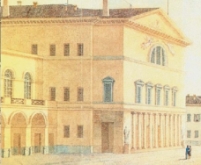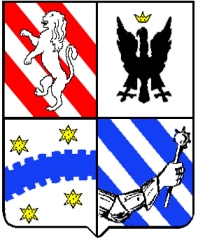Scandal at the court of Her Majesty, Queen Caroline Amelia Elizabeth
 Some of you may be familiar with the story of Caroline of Brunswick who arrived in England in 1795 to marry the future King George IV. As was usual for royal marriages of the time, it was arranged for political and dynastic reasons – not love, but in the case of George and Caroline they actively disliked each other and parted ways after the birth of their daughter.
Some of you may be familiar with the story of Caroline of Brunswick who arrived in England in 1795 to marry the future King George IV. As was usual for royal marriages of the time, it was arranged for political and dynastic reasons – not love, but in the case of George and Caroline they actively disliked each other and parted ways after the birth of their daughter.
George and Caroline each had their own Courts – not unusual for the time – but what was unusual was that Caroline’s Court was as licentious as George’s, and moreover she was not discrete. Rumours spread of her alleged affairs and indecorous behaviour (especially abroad) until a “Delicate Investigation” was finally launched in 1820.
The main accusation was that she had been intimate with her chamberlain (Pergami/Bergami) and that he had been rapidly elevated to the rank of Baron Franchini . Her accusers demanded to know “for what talents” this man had been suddenly covered with orders and honours?”
Details of this trial can be found in a text entitled “The important and eventful trial of Queen Caroline, consort of George IV for “adulterous intercourse” with Bartolomo Bergami”. It’s always more fascinating to read these stories in the words of people from the period so I decided to share a few sections that can serve as a sort of summary of the Baron Franchini affair.
The main accusations concerning the Queen and Baron Franchini
At Milan this man had been employed as a courier in General Pino’s service. He afterwards was admitted to the same rank in her Royal Highness’s household. But in the course of a few months he became her Royal Highness’s equerry, then her chamberlain, then, by her influence, Knight of Malta, then Baron de la Franchini, then Knight of the Holy Sepulchre at Jerusalem, and then Grand Master of the order which her Royal Highness herself created. They would find him also possessed of a considerable property at the very gates of Milan.
The man who had been a few years before living in a prison (for what reason he knew not) who had received three liri a-day from General Pino they found this man suddenly covered with orders and honours. For what cause? for what service? for what talents? He asked this, because, when their Lordships considered it, together with the other facts, it strengthened and confirmed the statement of the witnesses, and made it almost impossible to adduce any other cause for the extraordinary love which her Royal Highness manifested towards this man, but that which was alleged.
Examples of the inappropriate behaviour of the Queen and Baron Franchini
In the course of a visit to Bellenzino, Bergami being still even in the dress of a courier, sat at the table of the Princess, and by her own invitation. Upon a subsequent occasion, the witness De Mont had seen Bergami pass through her chamber at night, and enter the room of the Princess. Upon those facts he would make no observation. At Villa Villani the same communication as usual. existed between the apartments, and a witness had stated, that the bed of Bergami appeared not to have been slept in.
He now came to Villa d’Este. The evidence which he was recapitulating had already occupied nearly three weeks of the time of their Lordships: and he trusted, that they would not think a few hours longer still bestowed if he should be compelled to detain them in the performance of the task which had devolved upon him. The arrangement of the bed-chambers at Villa d’Este was important. At a subsequent period, after the return from the Greciari voyage, a door had been absolutely opened to facilitate the communication. In cases like the present, everything was to be inferred from the general conduct of the parties; and it had been clearly shown, that the Princess and Bergami were constantly conducting themselves like lovers, or like man and wife during the day, while every preparation was made to prevent the interruption of their intercourse during the night. The familiarities at the Villa d’Este were not spoken to by one, two, or three witnesses, but by such a body of testimony as set doubt at defiance.
Walking arm in arm in the gardens; alone in a canoe upon the Lake; embracing and kissing each other; where such intimacies were proved, even between persons in an  equal rank of life, accompanied by a constant anxiety for access to the bed-chamber of each other, no court could refuse to draw the inference that adultery had been committed. To go through the whole series of evidence would only be to fatigue the House: but what would be said to the testimony of Ragazzoni with respect to the statues—to the figures of Adam and Eve? He remembered, that in the very case upon which he had already stated to the House the judgment of Sir William Scott, in that very case a letter had been’ produced written by the lady to her lover, in which she related some circumstances of an indecent nature. To that letter as evidence the learned Judge had most particularly adverted ; saying that no woman would have so written to a man, unless adulterous intercourse had taken place between them. That observation applied most fully to the case in point. The learned gentleman then recapitulated at considerable length the evidence of the witnesses Galdini, Bianchi, and Luccini, which he considered as utterly irresistible, and upon which he declined to make any observations.
equal rank of life, accompanied by a constant anxiety for access to the bed-chamber of each other, no court could refuse to draw the inference that adultery had been committed. To go through the whole series of evidence would only be to fatigue the House: but what would be said to the testimony of Ragazzoni with respect to the statues—to the figures of Adam and Eve? He remembered, that in the very case upon which he had already stated to the House the judgment of Sir William Scott, in that very case a letter had been’ produced written by the lady to her lover, in which she related some circumstances of an indecent nature. To that letter as evidence the learned Judge had most particularly adverted ; saying that no woman would have so written to a man, unless adulterous intercourse had taken place between them. That observation applied most fully to the case in point. The learned gentleman then recapitulated at considerable length the evidence of the witnesses Galdini, Bianchi, and Luccini, which he considered as utterly irresistible, and upon which he declined to make any observations.
He now came to what occurred in Sicily. When her Royal Highness and Bergami arrived at Messina, the intercourse between them had continued so long, that her Royal Highness appeared in the bedroom of Bergami in her night-dress, with the single addition of a mantle. At Messina, Bergami asked leave of absence, to make some purchases. The witness, Majochi, described the manner in which they separated. Her Royal Highness called him, ” mon cceur,” ” mon ami,” and he embraced her in the warmest manner. The parties were found in that situation at Messina, kissing, fondling, and embracing each other.
They now proceeded to embark on board the Clorinde, Captain Pechell. Here some hesitation arose about the table at which the Princess was to be entertained. Captain Pechell said, “I am desirous, in every possible way, to afford accommodation to your Royal Highness, but there is one point on which I must insist; there is one sacrifice to be made by your Royal Highness, without which I cannot provide for you at my table. I, as a British officer, cannot sit down at the same table with a man who has stood behind a chair. I should be degraded and dishonoured if I conceded this point.” A message was sent to her Royal Highness on the subject, but she treated the matter very lightly. She observed that she had no desire to incommode Captain Pechell, and felt no wish to give him “the trouble of  forming a second table. This was the motive she assigned for dining with Bergami. But was this really her motive? Was this statement true? Her Royal Highness had, for a considerable time before, been in the habit of dining with this man. It was not, therefore, for the purpose of saving Captain Pechell the inconvenience of having two tables that she proposed dining on board with Bergami; but because it had long been her habit, and she was determined to bow to it. Captain Pechell did not, however, wish to be so accommodated, and he replied, “I am ready to provide for Bergami elsewhere.” The moment her Royal Highness said sbe wished to accommodate Captain Pechell, this was his observation.; and one would suppose that her Royal Highness would at once have said, ” here the difficulty ceases—provide a table for him elsewhere.” Her Royal Highness took time to consider of it, she refused the proffered accommodation, and Bergami dined with her during the voyage. Why did he mention this? To show that the conduct of her Royal Highness was not plain and direct—to show that she concealed the truth—and that she would not, even for the sake of saving appearances, make the sacrifice required.
forming a second table. This was the motive she assigned for dining with Bergami. But was this really her motive? Was this statement true? Her Royal Highness had, for a considerable time before, been in the habit of dining with this man. It was not, therefore, for the purpose of saving Captain Pechell the inconvenience of having two tables that she proposed dining on board with Bergami; but because it had long been her habit, and she was determined to bow to it. Captain Pechell did not, however, wish to be so accommodated, and he replied, “I am ready to provide for Bergami elsewhere.” The moment her Royal Highness said sbe wished to accommodate Captain Pechell, this was his observation.; and one would suppose that her Royal Highness would at once have said, ” here the difficulty ceases—provide a table for him elsewhere.” Her Royal Highness took time to consider of it, she refused the proffered accommodation, and Bergami dined with her during the voyage. Why did he mention this? To show that the conduct of her Royal Highness was not plain and direct—to show that she concealed the truth—and that she would not, even for the sake of saving appearances, make the sacrifice required.
She now proceeded to Catania, and he begged leave to call their Lordships’ attention to what passed there, because it was most important. There was a particular arrangement of apartments, which, in consequence of the indisposition of Bergami, was afterwards altered. Her Royal Highness slept in the room adjoining that of Mad. De Mont and her sister, Marietta Bron, and on the other side of that room slept the Countess of Oldi. Bergami being ill, he was put into the room previously occupied by the Countess Oldi, and the Countess was placed in the apartment of her Royal Highness. It would be seen, therefore, that up to this period De Mont and her sister slept between the apartment occupied by Bergami and that allotted to her Royal Highness. They were in the habit of going to breakfast about nine o’clock; the door which communicated with their room was sometimes open, sometimes closed; but, on one particular morning, happening to remain beyond the usual time (to the best of her recollection, her sister being present, about the hour of ten, her Royal Highness, carrying the pillows on which she was accustomed to sleep, came out of the room of Bergami. She saw De Mont—she eyed her, and passed into her own room, contrary to  her usual custom, without saying anything.
her usual custom, without saying anything.
He believed that no questions were put, as to that part of the case, by the learned counsel on the other side; but their Lordships, in the discharge of that important duty which had been cast upon them, thought it necessary that some questions should be asked, to ascertain whether a large portion of time had not been passed by her Royal Highness in the bedroom of Bergami? Their Lordships asked, whether De Mont had quitted the room that morning; to which she answered, that she had not. How long had she been awake? She answered, two hours. Whether, during that time, her Royal Highness passed through the room? Her answer was, no. Then the inference “was that certainly for two hours her Royal Highness had been in the bedroom of the courier.” When he stated this fact, he was aware it would be again said, that it depended on the evidence of De Mont, and therefore it became necessary, as much of what he had to introduce rested on the credit, fortified and supported as it was by corroborative statements, to say a word or two with respect to what had been thrown out on the other side, for the purpose of impeaching her testimony. Certain letters were brought forward, in which the fine feeling, the extensive charity, the exalted generosity, and all those distinguished qualities which her Royal Highness was said to possess in a most eminent degree,
. . . . .
If what the counsel on the other side were saying was correct—if there were no ground for casting an imputation on the character of her Royal Highness—if there were nothing mysterious in the conduct of this courier— if Bergami were advanced in the service solely on account of his merits, and the respect he bore to an honourable mistress; if such were his situation, and the character of his connexion, what was the inevitable conclusion to which it led ? Could there be a more desirable witness than that man himself, to contradict the testimony of De Mont? She spoke of his conduct when the three parties only were present, not on one occasion, but many. If the connexion of Bergami with her Royal Highness were such as was alleged in the bill, he certainly could not appear at their Lordships’ bar ; but if it were a pure connexion, unsullied by those circumstances which he (the Solicitor-General) had stated, why was he not opposed to this witness ? Why was he not brought forward to contradict De Mont —to show that a base attack was made on the character and honour of the most amiable Princess in the world—to prove .that De Mont had been falsely accusing her Royal Highness with crimes that were never committed ?
Having made these observations on the statement of his learned friend, relative to the testimony of this witness, he called on their Lordships to consider the whole of the evidence, to take all the story together, and to see whether she was ultimately contradicted in any point that could destroy the inference to which her testimony must evidently lead. He asked of their Lordships to mark the evidence on both sides, and to mark how the case then stood.
While they were at Catania, a picture of her Royal Highness was painted, in the character of a ” Penitent Magdalen.” He need not describe to their Lordships what a “Penitent Magdalen” was ; nor was it necessary to state, that, in such pictures, the person was always – considerably exposed.
You can continue reading at:






